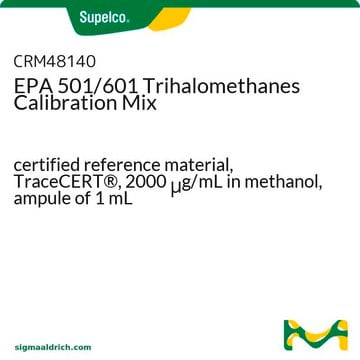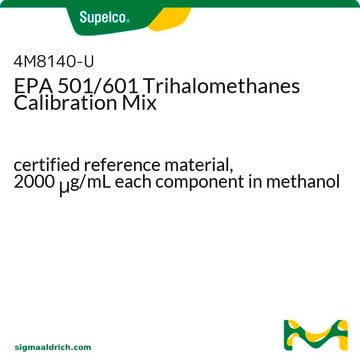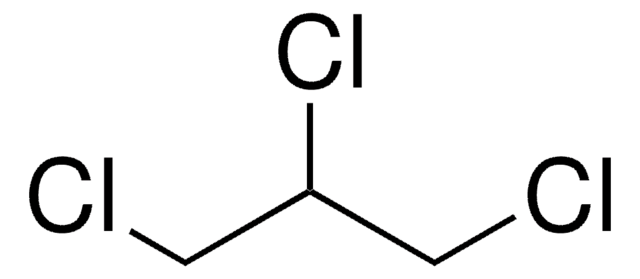49107-U
552.2 Haloacetic Acids Mix
certified reference material, 2000 μg/mL each component in methyl tert-butyl ether
Iniciar sesiónpara Ver la Fijación de precios por contrato y de la organización
About This Item
UNSPSC Code:
77101502
NACRES:
NA.24
Productos recomendados
grade
certified reference material
TraceCERT®
agency
EPA 552.2
product line
TraceCERT®
CofA
current certificate can be downloaded
feature
standard type calibration
packaging
ampule of 1 mL
concentration
2000 μg/mL each component in methyl tert-butyl ether
technique(s)
HPLC: suitable
gas chromatography (GC): suitable
application(s)
environmental
format
multi-component solution
storage temp.
2-8°C
General description
EPA 552.2 Haloacetic Acids Mix is a multi-component solution containing bromoacetic acid, bromochloroacetic acid, bromodichloroacetic acid, chloroacetic acid, dibromochloroacetic acid, dibromoacetic acid, dichloroacetic acid, tribromoacetic acid, and trichloroacetic acid as certified reference materials (CRMs). The raw materials and solvents used in the preparation of EPA 552.2 Haloacetic Acids Mix have been screened for identity and purity. The mixture is gravimetrically prepared and quantitatively analyzed by gas chromatography (GC).
US EPA 500 Series methods are analytical methods for identifying and quantifying organic contaminants such as volatile organic compounds (VOCs), pesticides, synthetic organic compounds (SOCs), and trihalomethane disinfection byproducts (THMs) in raw source water, finished drinking water, and drinking water at all stages of treatment.
US EPA 500 Series methods are analytical methods for identifying and quantifying organic contaminants such as volatile organic compounds (VOCs), pesticides, synthetic organic compounds (SOCs), and trihalomethane disinfection byproducts (THMs) in raw source water, finished drinking water, and drinking water at all stages of treatment.
Application
EPA Method 552.2 Haloacetic Acids Mix is used as a CRM to quantify halogenated carbonaceous disinfection by-products (C-DBPs) in drinking water, tap water, treated water, and wastewater samples by gas chromatography (GC) based techniques.
Refer to the product′s Certificate of Analysis for more information on a suitable instrument technique. Contact Technical Service for further support.
Other Notes
This Certified Reference Material (CRM) is produced and certified in accordance with ISO 17034 and ISO/IEC 17025. All information regarding the use of this CRM can be found on the certificate of analysis.
Legal Information
TraceCERT is a registered trademark of Merck KGaA, Darmstadt, Germany
Analito
Descripción
Bromoacetic acid
Bromochloroacetic acid
Bromodichloroacetic acid
Chloroacetic acid
Dibromochloroacetic acid
Dibromoacetic acid
Dichloroacetic acid
Tribromoacetic acid
Trichloroacetic acid
Ver todo (9)
signalword
Danger
hcodes
Hazard Classifications
Flam. Liq. 2 - Skin Irrit. 2
Storage Class
3 - Flammable liquids
wgk_germany
WGK 3
flash_point_f
-27.4 °F - closed cup
flash_point_c
-33.0 °C - closed cup
ppe
Eyeshields, Gloves
Elija entre una de las versiones más recientes:
¿Ya tiene este producto?
Encuentre la documentación para los productos que ha comprado recientemente en la Biblioteca de documentos.
Predicting the formation of haloacetonitriles and haloacetamides by simulated distribution system tests
Sfynia C, et al.
Procedia Engineering, 186(8), 186-192 (2017)
Degradation of haloacetic acids with the Fenton-like and analysis by GC-MS: use of bioassays for monitoring of genotoxic, mutagenic and cytotoxic effects
Mour?o AO, et al.
Environmental Monitoring and Assessment, 191(8), 513-513 (2019)
Evidence of arsenic release promoted by disinfection by-products within drinking-water distribution systems
Andra SS, et al.
The Science of the Total Environment, 472(8), 1145-1151 (2014)
Amanda Oliveira Mourão et al.
Environmental monitoring and assessment, 191(8), 513-513 (2019-07-28)
In this study, a method was developed to evaluate the degradation of haloacetic acids (HAAs) in water by a heterogenous Fenton-like process catalyzed by cobalt-doped magnetite nanoparticles (Fe3 - xCoxO4), extraction of the contaminants by liquid-liquid extraction (LLE), and analysis
Carbonaceous and nitrogenous disinfection byproduct precursor variation during the reversed anaerobic-anoxic-oxic process of a sewage treatment plant
Han H, et al.
Environments, 65(8), 335-346 (2018)
Nuestro equipo de científicos tiene experiencia en todas las áreas de investigación: Ciencias de la vida, Ciencia de los materiales, Síntesis química, Cromatografía, Analítica y muchas otras.
Póngase en contacto con el Servicio técnico








